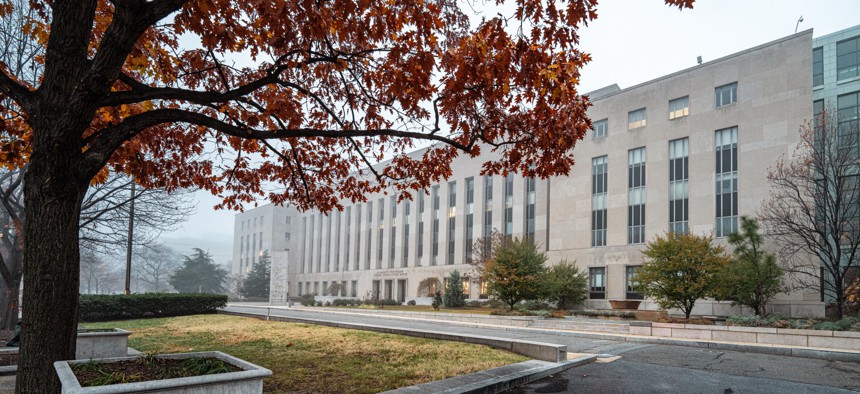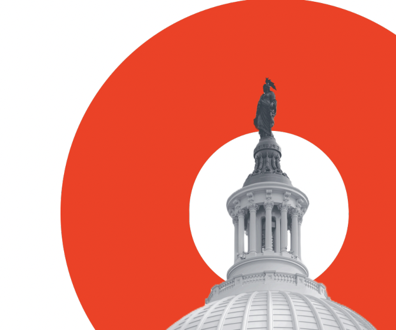
The U.S. Court of Appeals for the D.C. Circuit is revisiting its prior ruling staying a preliminary injunction of the Trump administration's move to end collective bargaining at several federal agencies. J. David Ake / Getty Images
Labor groups warn of ‘gaping hole’ in First Amendment if court OKs Trump’s anti-union orders
The full U.S. Court of Appeals for the D.C. Circuit will reexamine a prior decision allowing the White House’s effort to strip two-thirds of the federal workforce of their collective bargaining rights to go into effect.
Attorneys for the nation’s largest federal employee union warned this week that the August decision to allow President Trump’s executive orders stripping two-thirds of the federal workforce of their collective bargaining rights would leave a “gaping hole” in the First Amendment if left in place.
Last month, a three-judge panel on the U.S. Court of Appeals for the Ninth Circuit issued a stay of an earlier preliminary injunction that found that the White House’s effort to outlaw unions at most federal agencies under the auspices of national security was mere pretext for retaliating against labor groups that had challenged the administration’s workforce policies in court, actions considered to be protected speech under the First Amendment. That effectively allowed implementation of the order to proceed during the course of litigation.
But later that month, a judge on the court called for all 11 jurists on the Ninth Circuit bench to examine whether to revisit the three-judge panel’s decision. The news came after federal agencies began formally terminating collective bargaining agreements, despite Justice Department attorneys’ and the Office of Personnel Management’s assurances that such steps would not be taken until the “conclusion of litigation.”
In a legal brief filed Monday, attorneys for the American Federation of Government Employees criticized the three-judge panel’s decision, which they said “effectively forecloses” Americans’ ability to claim they were retaliated against by the federal government for protected speech. The panel originally reasoned that the administration would have taken this course of action regardless of the unions’ actions, thereby diffusing the claim of a First Amendment violation.
“It is well-established that if a district court finds that First Amendment activity was a substantial or motivating factor in the government’s conduct toward the plaintiff, the burden shifts to the government to prove by a preponderance of the evidence that it would have taken the same action even without the impetus to retaliate,” the union wrote. “[By] determining conclusively that ‘on this record the government has shown that the president would have taken the same action even in the absence of the protected conduct,’ the panel upended this burden-shifting scheme and absolved the government of its burden of proof. The panel’s analysis is tantamount to the adoption of a legal rule that a claim of First Amendment retaliation fails as a matter of law as long as the government, at the same time it engages in the retaliatory conduct, ‘fairly indicates’ a non-retaliatory rationale for the conduct.”
If the Trump administration has its way, AFGE argued, it would have carte blanche to retaliate against conduct protected by the First Amendment simply by invoking national security. The argument comes as the administration has attempted to retaliate against media companies like ABC and against federal workers who have signed letters dissenting from their agency leaders’ directives.
“This is no hypothetical concern, as this executive order is far from the only instance in which the current administration has taken punitive measures against private parties for engaging in speech and petitioning,” AFGE wrote. “The panel’s stay order is this court’s first published decision addressing an allegation of retaliatory conduct by this administration, and its holding effectively allows the government to prevail in such a case as a matter of law by mouthing the words ‘national security’ as a motivation for its conduct.”
The Trump administration, for its part, said in a pair of legal filings that even if its actions are determined to be retaliatory, it is within the president’s power to do so as part of making national security determinations.
“Here, there can be no doubt that First Amendment-protected activity is a legitimate consideration in the president’s [national security] determination,” Justice Department lawyers wrote. “Congress explicitly authorized the president to consider how ‘the provisions of this chapter’ interact with ‘national security requirements and considerations.’ Those provisions authorize the very activity about which plaintiffs are concerned . . . Furthermore, in making these determinations, the president does not ‘re-define national security;’ rather, Congress delegated that definitional authority to the president in the first instance.”
A motions hearing at the district court level is scheduled for Sept. 30. There is no public timetable for the circuit court’s decision on whether to reconsider the Trump administration’s stay application.
Share your news tips with us: Erich Wagner: ewagner@govexec.com; Signal: ewagner.47
NEXT STORY: The Interior Department is taking steps to implement layoffs







